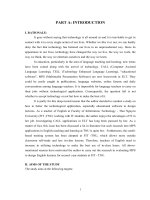Thiết kế bài dạy môn Tiếng Anh 11 - Unit 4: Volunteer work and literacy programmes (grade 11 - Advanced)
Bạn đang xem bản rút gọn của tài liệu. Xem và tải ngay bản đầy đủ của tài liệu tại đây (188.41 KB, 4 trang )
<span class='text_page_counter'>(1)</span>Unit 4: VOLUNTEER WORK AND LITERACY PROGRAMMES ( GRADE 11- ADVANCED) E. LANGUAGE FOCUS I. STATEMENT: Caâu phaùt bieåu (thuoäc daïng caâu khaúng ñònh vaø phuû ñònh) (THAT) SAID ( to+O) + V (đổi thì) TOLD + O Ex: - He said, “I like football.” → He said that he liked to play football. “Tom will fly to Paris next week,” said Miss Hoa. → Miss Hoa said that Tom would fly to Paris the following week. II. QUESTIONS: (Daïng caâu hoûi) S. S +. Ex:. ASKED + O WONDERED WANTED TO KNOW. S + V (đổi thì) if / whether (yes/ no question) “Wh” / how (wh-question) She said to me, “Will she come?” → She asked me if she would come. “Where do you live?” asked the foreigner. → The foreigner asked me where I lived.. Notes:. 1. Ngoâi: - Đổi ngôi thứ NHẤT (I, we) phù hợp với CHỦ TỪ trong mệnh đề chính - Đổi ngôi thứ HAI (you) phù hợp với TÚC TỪ trong mệnh đề chính - Ngôi thứ BA ( she, he, it, they) không đổi Ex: He said to me “Give your toys to her, please!” He asked me to give my toys to her. 2. Converting tenses and adverbs of time, place: DIRECT INDIRECT - V1 (s/es) → V2 /ed - V2 → had + V3 - has/ have + V3 → had + V3 - am/ is/ are + Ving → was / were + Ving - was / were + Ving → had + been +V-ing - can → could + V0 - will → would + V0 - may → might + V0 - must / have to → had to - had + V3 → had + been +V-ing. Lop11.com. DIRECT - yesterday - last night - two years ago - today - tonight - tomorrow - next year - this - these - here - now. INDIRECT → the previous day the day before → the previous night the night before → two years before → that day → that night → the following day the day after the next day → the following year → the year after → those → there → then.
<span class='text_page_counter'>(2)</span> III. COMMANDS & REQUESTS: Câu yêu cầu (thuộc dạng mệnh lệnh hoặc yêu cầu). S + asked (told, advised,..) + O + (not) to V….. *** Các bước chuyển từ câu mệnh lệnh trực tiếp sang gián tiếp 1. Đổi động từ giới thiệu sang : “asked, told, ordered, advised, requested, reminded, begged….”. 2. – Nếu là câu ra lệnh khẳng định Thêm to vào trước động từ. Ex: He said to me “Give your toys to her, please!” He asked me to give my toys to her. – Nếu là câu ra lệnh phủ định Thêm not to vào trước động từ. Ex: He said to me “Don’t open this book now.” He asked me not to open that book then. 3.Khi đổi câu mệnh lệnh (Imperatives) sang gián tiếp, ta đổi HAI yếu tố là ngôi, và trạng từ chỉ thời gian và nơi chốn. (tương tự như đối với statements and questions) IV. Reported speech with To-infinitive:. S + V + (O) + (not) + to -infinitive. Những động từ tường thuật của lời dẫn gián tiếp có động từ nguyên mẫu gồm có: tell, ask, advise, warn, remind, encourage, invite, agree, persuade + O + to V want, promise , offer, agree , threaten, hope + to V * Dạng đặc biệt của câu hỏi trong lời nói gián tiếp: - Shall/ Would/ Could I/ we…………..? → S + offered + (not) to + V0 dùng để diễn tả đề nghị Ex: “ Could I take you to the post office?” Johnny said → Johnny offered to take me to the post office - “Can/ could/ will / would you -.., please?” “would/ do you mind? -S + told/ asked + O + to+ V0 Xem như lời yêu cầu - “Would you like …?” → S + invited + O + to + V0 xem như lời mời -“should/ ought to; had better; If I were…”“Why don’t you + V1 …. ? “→ S + advised + O + to + V0 : Dùng để diễn tả lời khuyên Ex: “ You should go to the doctor, Linda” Marie said → Marie advised Linda to go to the doctor Ex: She said to him, “ Why don’t you go to the doctor?” → She advised him to go to the doctor.. - Yêu cầu đối với các nghi vấn từ: how, where, when,….. (ít gặp) Ex: “ How shall I get to Lan’ s house ?” said Nam → Nam wanted to know how to get to Lan’s house. Lop11.com.
<span class='text_page_counter'>(3)</span> II. Reported speech with Gerunds: S + V + (O) + preposition + (not) + V-ing. * Khi đổi câu sang câu tường thuật với danh động từ. 1. Đổi động từ giới thiệu sang: “suggested, proposed, requested, denied, admitted, insisted on, apologized for, thanked... for..., congratulated... on... dream (of) , look forward (to), congratulate (on), accuse (of), object to, complain about,… suggest, deny, admit, insist on, think of, dream of, look forward to S + V (with gerunds)+ V-ing Ex: “Let’s spend the day at the beach.” said Mary. Mary suggested spending the day at the beach. “I’ll pay for the meal.” said Tom. Tom insisted on paying the meal. thank…for , apologise+ ( to sb)+ for, congratulate…on, accuse…of, warn….against, prevent…from, stop ….from S + V (with gerunds) + O + prepositions + V-ing Ex: “It was nice of you to help me.” Minh said to Lan. Minh thanked Lan for helping him. 2. Thêm V-ing vào sau động từ chính. 3. Đổi ngôi 4. Đổi trạng từ chỉ thời gian và nơi chốn ** Những dạng đặc biệt của reported speech with gerunds: - Biểu đạt một mơ ước: Ex: “ I always wishes to become a good doctor” said Linda → Linda has always dreamed of becoming a good doctor - Biểu đạt sự phủ nhận : Ex: “ No, of course not. I didn’t damage your computer” siad Peter → Peter denied damaging my computer - Biểu đạt sự trông ngóng : Ex: “ I can’t wait until August to go to Paris for my holiday” said my sister → My sister looked forward to going to Paris for her holiday - Biểu đạt lời buộc tội: Ex: “ You stole the money I put on the table this morning” said my brother → My brother accused me of stealing the money he had put on the table that morning - Biểu đạt sự khăng khăng đòi làm gì đó: Ex: “ No. Let me pay for the meal. Not you” David insisted → David insisted on paying for the meal - Biểu đạt sự ngăn cấm: Ex: “ No, no. Sit down and don’t go out of the class” said the teacher → The teacher prevented us from going out of the class - Biểu đạt lời chúc mừng: EX: “ You’ve won the gold medal. Congratulation, An!” said the teacher → The teacher congratulated An on winning the gold medal - Biểu đạt lời xin lỗi: Ex: “ I’m terribly sorry. I was so impolite to you yesterday” said my friend → My friend apologized for being impolite to me yesterday Lop11.com.
<span class='text_page_counter'>(4)</span> - Biểu đạt lời thú nhận: Ex: “ Yes. You ‘re right. I broke the vase while cleaning the table” said she. → She admitting breaking the vase - Biểu đạt lời đề nghị: Let’s. + V0 …. // Why don’t we + V1 ….. // What about + Ving ….→ S + suggested + Ving ……. Ex: Let’s go to the neach instead” said he. → He suggested going to the beach instead Timmy said, “ Why don’t we go on a picnic” → Timmy suggested going on a picnic.. ** Practice exercise: Change the sentences into indirect speech 1. “ I’m terribly sorry. I have broken a vase,” he said to his mother →……………………………………………………………………… 2. “ Why don’t you sell your old house?” my friend said to me →……………………………………………………………………… 3. “ Would you like to have coffe with me?” John said to me →……………………………………………………………………… 4. “ why don’t you decorate your house?” my friend said to me →……………………………………………………………………… 5. “ Thank for your kindness of letting us stay with you,” said the man →……………………………………………………………………… 6. “ Let’s not mention this problem again,” the old man said →……………………………………………………………………… 7. “ If I were you, I would revise for that exam,” said th tutor →……………………………………………………………………… 8. “ I hear that you have won the game spectacularly. Congratulation.” Anna said →……………………………………………………………………… 9. “ Shall we go to a fashion show this weekend?” said Lisa →……………………………………………………………………… 10. “I’ll help you with this homwork,” my brother said →………………………………………………………………………. Lop11.com.
<span class='text_page_counter'>(5)</span>









